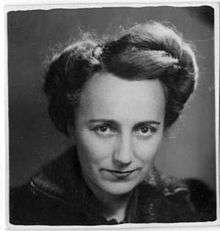Anne Desclos
| Anne Desclos | |
|---|---|
 | |
| Born |
23 September 1907 Rochefort, France |
| Died |
27 April 1998 (aged 90) Corbeil-Essonnes, France |
| Occupation | Journalist, Novelist |
| Nationality | French |
| Genre | Fictional prose |
Anne Cécile Desclos (23 September 1907 – 27 April 1998) was a French journalist and novelist who wrote under the pseudonyms Dominique Aury and Pauline Réage.
Early life
Born in Rochefort, Charente-Maritime, France to a bilingual family, Desclos began reading in French and English at an early age. After completing her studies at the Sorbonne, she worked as a journalist until 1946 when she joined Gallimard Publishers as the editorial secretary for one of its imprints where she began using the pen name of Dominique Aury.
An avid reader of English, Desclos either translated or introduced to readers in France such renowned authors as Algernon Charles Swinburne, Evelyn Waugh, Virginia Woolf, T. S. Eliot, F. Scott Fitzgerald and numerous others. She became a critic and was made a member of the jury for several prominent literary awards.
Career
Desclos' lover and employer Jean Paulhan, a fervent admirer of the Marquis de Sade, had made the remark to her that no woman was capable of writing an erotic novel. To prove him wrong, Desclos wrote a graphic, sadomasochistic novel that was published under the pseudonym Pauline Réage in June 1954.[1] Titled Histoire d'O (Story of O), with a sympathetic preface by Jean Paulhan which nevertheless did not reveal her identity, it was an enormous, though controversial, commercial success. The book caused much speculation as to the identity of the author. Many doubted that it was a woman, let alone the demure, intellectual, and almost prudish persona displayed in Dominique Aury's writings. Many well-known male writers were alternately suspected to be the author, including André Malraux and Henri de Montherlant.
In addition, the book's graphic content sparked so much controversy that the following March the government authorities brought obscenity charges against the publisher and its mysterious author that were thrown out of court in 1959. However, a publicity ban and a restriction on the book's sale to minors was imposed by the judge. Following the lifting of the publicity ban in 1967, the conclusion to Story of O was published under the title Retour à Roissy using the pseudonym of Pauline Réage. However, according to her recent biography by Angie David, Desclos did not write this second novel. In 1975, she did a long interview about erotic books with author Régine Deforges, published by Story of O editor Jean-Jacques Pauvert, yet at the time her authorship was still unknown. An English-language edition of the interview was released in the United States in 1979 by Viking Press. Gregory Stephenson's in-depth essay on The Story of O was published in the Spring 2014 online edition of Rain Taxi.[2]
Eventually, Desclos publicly admitted that she was the author of The Story of O in 1994, 40 years after the book was published, in an interview with The New Yorker.[1][3][4][5] She also explained the pseudonym of Pauline Réage: she chose the first name in homage to Pauline Bonaparte and Pauline Roland and she randomly picked up the name of Réage on a topographic map.
Personal life
Desclos had a long-term relationship with her employer Jean Paulhan, the director of the prestigious Nouvelle Revue Française, who was 23 years older than her. She was actively bisexual at times in her life.[6] She notoriously had a liaison with historian and novelist Édith Thomas, who may have been an inspiration for the character of Anne-Marie in Story of O. She had a son from a brief marriage in her early twenties.
See also
- Chantons sous l'Occupation – a documentary film
Sources
- Dominique Aury by Angie David – Editions Léo Scheer, 560 pp – ISBN 2-7561-0030-7 – Biography in French
References
- 1 2 Ciuraru, Carmela (11 June 2011). "The Story of the Story of O". Guernica. Retrieved 31 December 2013.
- ↑ http://www.raintaxi.com/name-upon-name/
- ↑ Bedell, Geraldine (24 July 2004). "I wrote the story of O". The Observer.
- ↑ Kaufmann, Dorothy (1 January 1998). "The Story of Two Women: Dominique Aury and Edith Thomas". Signs. 23 (4): 883–905. JSTOR 3175197. doi:10.2307/3175197 (inactive 31 January 2017).
- ↑ De St. Jorre, John (1 August 1994). "The Unmasking of O". The New Yorker. pp. 42–43.
- ↑ Garcin, Jérôme (8 August 2002). "Histoire D'O". Nouvel Observateur (in French).
- Watson, Sasha (4 March 2010). "The Smuttiest French Novel Ever Written, Still Shocking 50 Years Later". Slate.
External links
- Writer of O, a 2004 documentary film by Pola Rapaport
- Name Upon Name at Rain Taxi